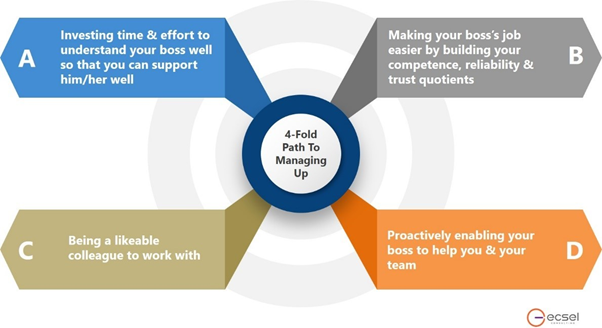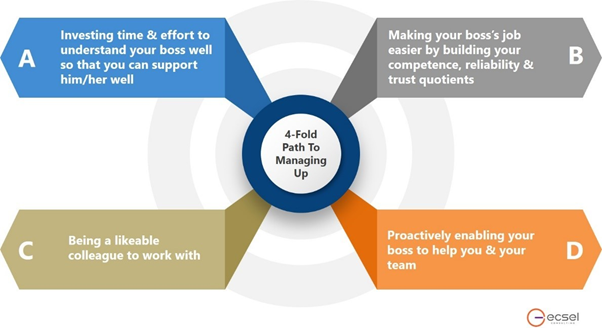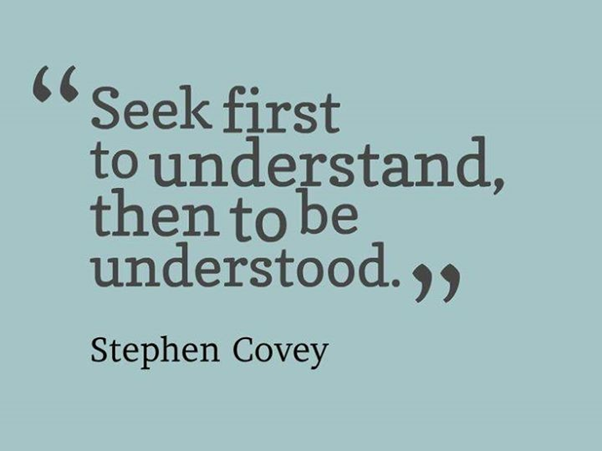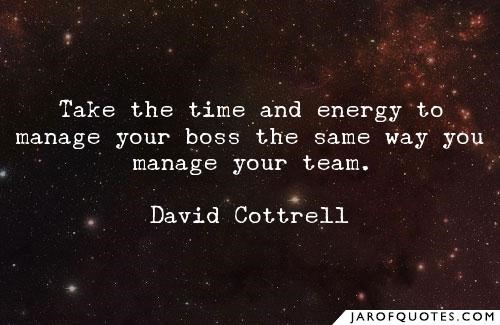- Have any questions?
- raju@ecselconsulting.com
‘Managing up’: how to manage your relationship with your boss more intentionally and impactfully for your career progress
7 tips for enhancing your informal leadership & influence (updated Dec 2021)
“The best time to plant a tree was 20 years ago. The second-best time is now.”

A look at my LinkedIn profile would tell you that my corporate career spanned 29 years, from 1987 to 2016. It doesn’t reveal that I worked with a total of 18 bosses in that time, including several periods when I had multiple bosses simultaneously as I was donning multiple hats.
It would be nice to imagine that the fair amount of success in that career is entirely a result of my professional competence, but that would only tell half the tale. To be sure, performance was the launchpad for my career growth at every stage. And I feel blessed in that most of my bosses were fundamentally good people. But, beyond my own performance and their soundness, there was something more that made them trust me, like me, and find me a reliable asset to themselves, for the team, and the organisation.
That something is what I had to do constantly – I had to actively manage the relationship. Walk up to any successful executive, and they will tell you the same thing – that they never took their boss for granted and actively managed ‘up.’ In this article, I propose to share with you some strategies, derived from my extensive experience, on how to manage the relationship so that you can each get the best from it.
WHY MANAGE UP?
Some of the things that can come in the way of a good working relationship with the boss are a lack of agreement on the challenges to be solved or the solutions that could work, unarticulated assumptions, unclear expectations, inadequate communication, and a contrast in working styles or simply in personality.
However, when the relationship works well, you both enjoy effective & free-flowing 2-way communication, clear expectations, common direction, good alignment, mutual trust, and camaraderie. Additionally, the organisation benefits from this as well.
If you walk away with nothing else from this article, I want you to be convinced about two key things.
First, it is up to you to intentionally manage your relationship with your boss and help him/her be a more effective manager and a better boss to you.
The second is that there might be hiccups or even breakdowns (hopefully temporary) in the relationship. Still, the onus is on you to take responsibility to have those issues addressed promptly in a way that works for both of you.
Even if you are in the minority who unfortunately may be reaching a point of no return with the boss – e.g., your boss is sabotaging your career, or wantonly ignoring you, or even stealing your credit – I believe that there is something in this article for you. I encourage you to try out some of the practices I have shared. I also referenced some additional reading in the last section that may work specially for you.
PRACTICAL STRATEGIES TO MANAGE UP EFFECTIVELY.
Doing your job competently is table stakes. What else is involved in managing up effectively? I have distilled the various practical lessons from navigating my own career, into 4 things that you should do.

Of course, each one of you will need to understand your own particular situation and boss, and evaluate what strategies could work for you. (for the sake of simplicity, allow me the liberty to use ‘they’ to indicate both male & female bosses in my stories that follow)
A. Understanding your boss(es) so you can best support them

Understand your boss’s KPIs (how their boss will judge them), key concerns and challenges, and focus on those. Ask them what their biggest priorities and key concerns are. Sometimes, talking to others (sorry, no gossip please!) and keeping your ears close to the ground will help you understand the challenges that your boss is facing from their boss or even otherwise, in the organisation. If you know what accomplishment would make your boss a success in the eyes of their boss and senior management, back them in that.
Proactively ask your boss what can enhance your working relationship, and what you can do to make it easier for them to manage you. You may get some direct answers; then leverage your observation powers of how others do it well, throw in some ‘trial & error’ to that.
Understanding your boss’s communication preferences is central to catering to their needs and could make the difference between being the go-to guy or a pest. Do they prefer grabbing a coffee together to formal meetings? Whatsapp messages, Slack or detailed email updates? Daily or weekly updates? Entire history or just highlights? ASK each of your bosses – how do you want me to keep you updated? How often would you like a status update on this project?
Of course, it is easier to understand the boss’ preferences than to then adapt one’s own personal style accordingly. In my case, my accountant training makes me a ‘details person’ which was at variance with some of my non-Finance bosses, and there were many times when I slipped into my default style and had to face a rebuff or a royal ignore.
B. Building up your trust & competence quotients

You can make your boss’s job easier by being a competent, reliable, trustworthy ally.
Keep your promises & exhibit strong ownership of your work. Your boss needs to trust you to get your job done, so that they aren’t left in the lurch. When you accept an assignment, follow through and deliver. Once you commit to something, get it done by the date and time that you promised. Leverage your boss if you need to, for crossing organisational hurdles. Most bosses feel proud and good when you give them opportunities to help you with such cases. At the same time, it is critical to anticipate difficulties and if you think you cannot deliver as promised, let your boss know in good time and help to manage the fall-out. Even though this involved showing vulnerability, admitting to difficulties and sometimes failure, personally I found it had the effect of bumping up my trust quotient.
Bosses seldom like surprises, not even with pleasant ones (does such a thing exist?). Don’t let them get blind-sided. Many times, out of good intention, we prefer to conceal conflicts or problems from them, revealing to the boss only after we’ve already solved these. While you may now have brought things under control, you could have put your team at risk and that can cost you the trust of your boss. My suggestion – Even as you make and execute the fire-fighting plan, in parallel own up and loop the boss in early.
Likewise, when you know that bad news is coming & is inevitable – say, an unhappy customer all set to escalate his / her complaint with a call to your boss – there’s only one thing to do – let them know before that call comes in, both about the issue and what you are doing to fix it. Don’t let them hear it from someone else. Don’t make them discover it for themselves. There’s nothing more annoying to a manager than being caught off guard and looking like he is not at the wheel. This is also about your honesty and transparency.
Coach Karin Hurt recommends the D.A.R.N. Method for sharing bad news with your boss.
D- Disclose. (Explain the situation and root cause) – No blindsides. They should hear the bad news from you FIRST. Not from their boss. Not from social media. Disclosing the bad news early, and often builds trust.
A-Accountability. (Don’t blame others at this time) – Take accountability. Even if it wasn’t completely your fault. You might say, “honestly, I should have been closer to this situation.” Or, “I know how important this is, and I want to do everything to make it right.”
R- Response. (Share your solution to fix the situation) – Explain what you’ve done so far to address the issue “I’ve called the customer to assuage their feelings and offer to make it right. And, alerted our social media team in case the customer goes to social media with this. I’ve given the supervisor a final written warning.” And
N- Next Steps. (share your plan and what you need next) – E.g. “I think we need to change our policies or procedures to ensure this never happens.”
When you see your boss in need, that is the best time to up your trust quotient. Let me share a turning point in my career in 2001. It was when my first boss at Disney, Raymund Miranda, wanted to move the Affiliate Sales function for SEA to his own team in Singapore (from the APAC office in HK) but did not have any approved headcount or the bandwidth to manage it. I asked him if I could try my hand at it, over and above my existing role. It meant a steep learning curve and very long hours for me, but with his support I ‘auditioned’ by cracking open the Indonesian market in 3-4 months. That gave him great confidence in me even as he met his own objective of bringing the Sales function directly under him.
Even as you build your profile, be mindful of the things to avoid: habitual bargaining on every matter, failing to check in or update, joining in ‘loose talk’ even as a joke, stealing the boss’s thunder or upstaging them in the desire to build your own image.
C. Being that likable colleague

Beyond competence, performance and all that jazz, we all like to work with congenial folk. Your boss is no different.
Embrace the mission to make your boss successful. Regardless of your job description, your top priority is always to make your boss successful. After all your role is a subset of their overall responsibility, and managers don’t want people on their team who drag them down. Remember the scene from ‘The Devil Wears Prada’ where Miranda Priestley’s assistant stealthily walks alongside her at a party and whispers into her ear who each guest is, so it’ll seem like she remembers everyone? That should be you.
Of course, this does not mean sucking up or blindly agreeing with anything the boss says or does. Even when you need to be the truth-teller like I often was, especially in my Finance roles, choose to do it respectfully and confidentially, in a way that they don’t feel undermined, and they are able to see that you genuinely want to help them be successful.
Advise, but then cooperate. I cannot forget the many corner office debates I used to have with Rob Gilby, my last boss at Disney. It was gratifying for me then, to hear him acknowledge at my office farewell in 2016, how I’d always offer my point of view and debate robustly but once the decision was taken (per my recommendation or not), I’d go about diligently and whole-heartedly implementing it. Of course, credit goes to Rob for always hearing me out. The gist of this is: put forward your perspective when your boss needs to make a decision but once it is made, put yourself solidly behind it & start executing, whether you agree with it or not.
When you do disagree with the boss, do so agreeably. Disagreeing with your boss’s decision is not a free pass for violating the chain of command or going behind their back.
Saying thanks: Expressing heartfelt appreciation for your boss’ support and feedback (even where negative) can make them feel warmer towards you, according to a research study by USC. Of course, this is not to be confused with fawning or flattery.
D. Enabling your boss to help you & your team (a.k.a. taking care of your interests & those of your team)

Explain how you’re best ‘managed’. Every boss has their own default management style; so, it’s up to you to help your boss understand how they can help you do your best work. This requires first, self-awareness and then, the courage to speak up. Cultivate both, then have the conversation with good timing. Be specific about what you need. And then, be prepared to give time for your boss to accept and adapt. (this may not be instantaneous but can yield rich dividend, as my experience with various bosses showed me)
For instance, as a very early riser and one impatient with traffic, I always preferred to reach work early (around 7:30 am, usually only the cleaners were around!) and leave the office before peak hours in the evening. It was the best way for me to manage my energy in accordance with my circadian rhythms. While technology allowed for 24×7 connectivity, office culture during my Disney days were yet to totally grow out of the physical presence hang-up. But, I was able to articulate my needs to my bosses, Mahesh Samat first & Rob Gilby later, earn their confidence that I would always be there when necessary, and set up our own unique mechanism to work together. My various teams & peers also co-operated in this.
Do your best to make their work easier, not harder. We all love to watch the news and lament the ills that plague the society and the nation, happily complacent that we will never be called upon to offer a solution. But that is not how your boss will think! Whenever you have to escalate problems, go to your boss with a coherent problem statement, some homework on causes, and definitely a suggested solution or two. At the very least, a suggestion for the direction to take.
As you get to know your boss better, you should be able to anticipate their needs and more proactively support those. Be generous in your support: is there some real-time industry news that your boss may not have picked up, or a good article that you spotted or some market intelligence that you just picked up… message it to them ahead of their upcoming 1-on-1 with their boss or their attendance at the industry roundtable. They’ll appear to be on top of their game, and recognize you as a key reason for that.
Ask your boss and get clarity about how you’ll be measured and rewarded. Specifically ask (a) What are your expectations of me/my team over the next year? (b) How will you measure whether I’ve fulfilled them? (c) If I exceed those targets, what does that mean for me? When it comes to feedback, it is a good idea to never accept fuzzy feedback – ask clarifying questions until you receive the specific guidance you need to take concrete action.
Career progression depends greatly on the exposure you get with the larger network of senior stakeholders in your organisation, and your boss is a key conduit for that – like the role my SEA boss (2006-08) Laura Wendt played in enhancing my image & exposure with the Disney HQ at Burbank.
To facilitate that, seek to Manage your boss’s communications about you and your team. Your ability to secure a promotion or the merit award and get the resources you need to succeed (budget $, manpower, support for initiatives) depends on how senior management perceives you and your department. Don’t leave this important issue ONLY in the hands of your boss. How?
Wear a ‘sales hat’ and consider what information the ultimate target audience (senior management) looks at, and equip your boss with the talking points, blurbs, facts & figures they need to properly represent you and your team. Offer to write material for reports, prepare slides, or even attend senior-level meetings and presentations with your boss. Seek opportunities to highlight, with supporting facts, how you are contributing to the team and its success.
HOW WELL ARE YOU ‘MANAGING UP’ currently?
Rate yourself on how well you ‘manage up’ using the following scale:

My hope is that understanding and applying these strategies will help you to improve your scores to approaching level 4 or higher, leading to more success and satisfaction in your career and life.
ADDITIONAL READING (for handling “jerks” as one of the article quoted below, calls them)
https://www.wsj.com/articles/hey-thats-my-idea-when-your-boss-steals-your-work-1543329410
https://bitesizebio.com/1540/6-types-of-bad-boss-and-how-to-handle-them/
https://www.knowablemagazine.org/article/society/2018/bad-bosses-dealing-abusive-supervisors
https://www.monster.com/career-advice/article/jerk-boss-behavior
